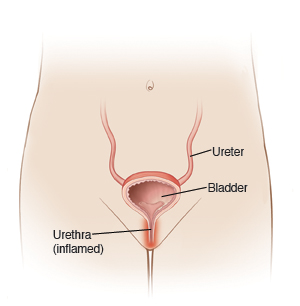Your child has urethritis. This means that the urethra is inflamed. The urethra is the tube that drains urine from the bladder to the outside of the body.
Urethritis has both infectious and noninfectious causes. Often chemicals, such as soap, bubble baths, laundry soap, or skin lotions, that get inside the urethra cause the irritation. This is called chemical urethritis. Other noninfectious causes of urethritis include:
-
An injury (can be accidental).
-
An allergic reaction.
Depending on your child's age, it can be hard to figure out what's bothering them. You may need to ask the same question in different ways to figure it out. Often the symptoms may seem like a bladder infection or urinary tract infection (UTI), but they aren't really caused by an infection. Symptoms may include:
-
Pain or a burning feeling in the urethra when peeing or not. (In a girl, the urethra is the opening above the vagina. In a boy, the urethra is the opening on the tip of the penis.)
-
Pain in the vagina or penis.
-
Feeling the need to pee often.
-
Not wanting to pee, which can cause your child to urinate on themselves.
-
Not wanting to drink because they'll have to pee.
-
Lower belly (abdominal) pressure or pain.
Symptoms often go away within 3 days after the last exposure.
Home care
Follow these guidelines to help care for your child at home.
-
Washing the genitals gently with a washcloth and soapy water should not cause a problem. Be careful so that soap does not get inside the urethra. Don't rub too hard or too much. This can irritate it more.
-
When potty training, teach girls to wipe from front to back.
-
Minimize douching, sprays, and powders in the genital area.
-
If you think bubble bath was the cause of urethritis, don't do any bubble baths. You can still try baths. But don't have your child soak in the tub with soap or shampoo in the water. Save this until the end.
-
Stop using any new lotions or soaps until the urethritis clears up.
-
Soaking in warm water without soap for about 10 minutes can help ease pain. Repeat as needed.
-
Use cotton underwear only.
-
Drink more liquids during the day. Urine should look light yellow, not dark.
-
You can give acetaminophen or ibuprofen for pain, fussiness, or discomfort. Don't use ibuprofen in infants younger than 6 months old. Talk with your child's doctor before giving these medicines if your child has chronic liver or kidney disease. Also talk with the doctor if your child has ever had a stomach ulcer or digestive tract bleeding or if your child takes blood thinner medicines.
-
If your child was given antibiotics for an infection, give them until they're used up or until the doctor tells you to stop. It's important to finish the antibiotics even if your child feels better. This is to make sure the infection has cleared.
Follow-up care
Follow up with your child's doctor, or as advised. If a culture specimen was taken, call as directed for the result.
When to get medical advice
Contact your child's doctor right away if your child:
-
Has symptoms that don't go away after 3 days.
-
Has a fever that repeatedly rises above 100.4°F (38°C) for a child of any age.
-
Is unable to pee.
-
Has more redness or rash in the genital area.
-
Has discharge from the penis or vagina.
Featured in


